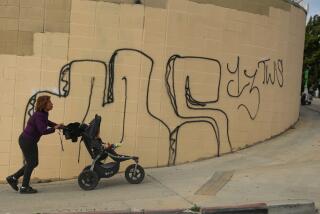For younger adults, unemployment may triple the risk of depression
- Share via
Unemployment isn’t just bad for your bank account. It can also do serious damage to mental health – especially for younger adults who are just starting out in life, new research shows.
Nearly 12% of Americans between ages 18 and 25 were deemed to be depressed based on their answers to eight questions that were part of a survey conducted by the Centers for Disease Control and Prevention and state health departments. But within this age group, those who were unemployed were 3.17 times more likely to be depressed than their counterparts with jobs.
“The high rate of unemployment among emerging adults is a public health problem,” wrote the authors of a study published Thursday in the CDC journal Preventing Chronic Disease. Depression during these formative years can have “long-term consequences,” they wrote, including setting people up for a lifetime of lower earnings.
The researchers, a pair of public health experts from Emory University in Atlanta, used data from the ongoing Behavioral Risk Factor Surveillance System. Survey participants answer questions about activities that may affect their health, including employment status. In the 2010 survey, 12 of the participating states asked questions about anxiety and depression. That allowed the researchers to examine the relationship between unemployment and mental health.
Research like this is tricky, since depression can be both a cause and a consequence of unemployment. Complicating matters further, there are things that can make people depressed and make it more difficult for them to find steady work, such as having a disability.
The Emory researchers did their best to untangle these relationships in their statistical modeling. In addition to disability status, they controlled for demographic variables such as race/ethnicity, gender, education and marital status. They also took into account each survey taker’s body mass index and smoking status.
In this model, they calculated that being unemployed more than tripled the risk of being depressed. They also found that people who had some kind of disability that limited their activities (but did not require special equipment, such as a wheelchair) were 5.28 times more likely to be depressed if they were unemployed.
Some groups of people had a weaker link between unemployment and depression. For instance, the risk of depression was merely doubled for women, married people, smokers and those without health insurance if they were unemployed.
The researchers said the findings should prompt health experts to focus on the particular plight of younger adults, who are overrepresented among the unemployed. (In the study, fully 23% of those surveyed said they did not have jobs.) In this age group, depression can prevent people from establishing their careers or starting a family. If they feel they are falling behind, they may make matters worse by turning to drugs or alcohol or engaging in other “health risk behaviors,” according to the study.
The researchers warned that their results don’t necessarily apply to all Americans in this vulnerable age group. The data came from only 12 states – Arizona, Georgia, Hawaii, Indiana, Louisiana, Mississippi, Missouri, Nevada, South Carolina, Vermont, Wisconsin and Wyoming – which may not be representative of the country as a whole.
Also, the survey takers weren’t able to interview people who were institutionalized, or people who only had wireless phones. As a result, “the generalizability of the study results is limited,” they wrote.
Follow me on Twitter @LATkarenkaplan and “like” Los Angeles Times Science & Health on Facebook.







